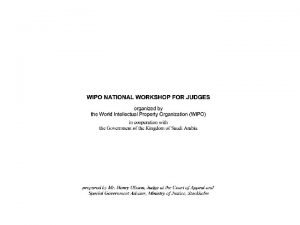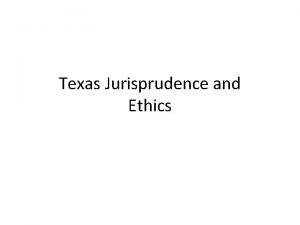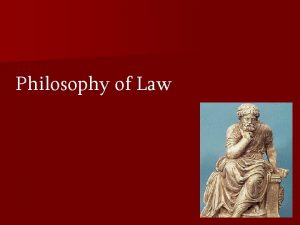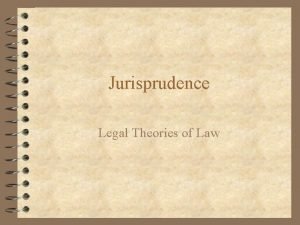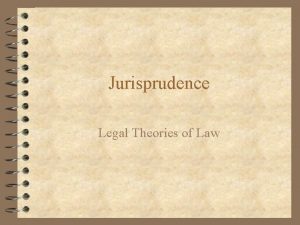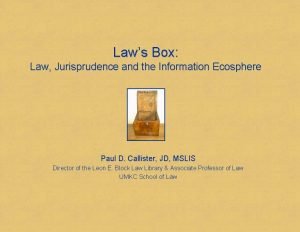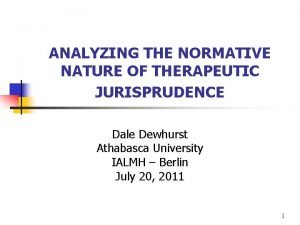Definition of Jurisprudence DEFINITION OF JURISPRUDENCE The English











- Slides: 11

Definition of Jurisprudence

DEFINITION OF JURISPRUDENCE �The English word "Jurisprudence" has been taken from a Latin word "Jurisprudentia", which consists of two words, 'Juris' and 'prudentia'. � 'Juris' means law and 'Prudentia' means knowledge. �Jurisprudence, therefore, literally means knowledge of law and its application. �It is difficult to give a singular definition of the term.

�Since the growth and development of law in different countries has been under different social and political conditions, the different jurists have given different definitions according to their own notion of the subjectmatter and so it is not possible to give a universal and uniform definition of Jurisprudence.

�So the different jurists have defined this term in different ways. �According to Ulpian "Jurisprudence is the knowledge of things human and divine, the science of the just and unjust". �The definition given by Ulpian is wide and broad enough because it includes the term 'Dharma' under Hindu Jurisprudence. It also covers the province of religion, ethics and philosophy.

Criticism of Ulpian’s Definition �The definition is wide and broad enough because it includes the term 'Dharma' under Hindu Jurisprudence. �It also covers the province of religion, ethics and philosophy. � The modern jurisprudence does not study the spiritual salvation. �It is now-a-days confined only to what Hindu jurists described as 'Vyavahara' which means those rules that determines the judicial proceedings or controversies.

According to Prof. Gray � "Jurisprudence is the science of law, the statement and systematic arrangement of the rules followed by the courts and the principles involved in those rules. ” � Jurisprudence deals with that kind of law which consists of rules enforced by courts while administering justice. � In other words, the laws of the jurists deal with man and seek to regulate external human conduct in the society. � It does not concern itself with the inner beliefs of man imposed in religious laws, which derive their authority from superhuman source which we call 'God'. � The sanction for their enforcement is spiritual reward or curse according to man's deeds.

According to Holland � "Jurisprudence is the formal science of � It is wrongly applied to actual systems positive law. " of law, or to current views of laws, or to suggestions for its amendment, but is the name of a science. � The science is a formal, or analytical, rather than a material one. It is the science of actual or positive law. � The essential ingredients of his definition of jurisprudence are as under: 1. Formal 2. Science 3. Positive Law.

According to Salmond � Jurisprudence classified in two different senses: 1. Wider (Generic) Sense 2. Narrow (Specific) Sense: � According to Salmond, "Jurisprudence in wider sense means the science of civil law. " � He says that in a generic and primary sense jurisprudence includes the entire body of legal doctrine. � Since jurisprudence is the knowledge of law, from this point of view it includes the entire book of laws.

�Salmond distinguishes jurisprudence in its generic sense, as including the entire body of legal doctrine, from jurisprudence in a more specific sense, in which it means a particular department of such doctrine exclusively. �He says that in its limited significance it may be called theoretical or general jurisprudence to distinguish it from the more practical and special departments of legal study. �In this sense "Jurisprudence is the science of first principle of civil law”.

According to Austin �"Jurisprudence is the Philosophy of Positive Law. " �He was the first jurist to make jurisprudence as a science. �By the term "Positive Law" he means 'jus positivum', that is law laid down by a political superior for commanding obedience from his subjects. � Austin divides jurisprudence into two parts, namely 1. General jurisprudence; and 2. Particular jurisprudence.

�By "General jurisprudence", he meant 'the science concerned with exposition of the principles of nations and distinctions which are common to all the systems of law‘. �Particular Jurisprudence consisted of the science of any such system of positive law as now obtains or once actually obtained in specifically determined nation.

